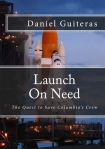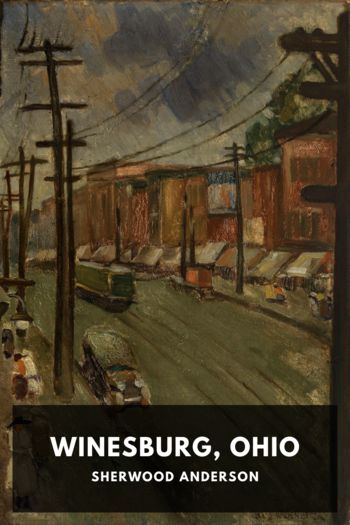Launch on Need, Daniel Guiteras [the giving tree read aloud TXT] 📗

- Author: Daniel Guiteras
Book online «Launch on Need, Daniel Guiteras [the giving tree read aloud TXT] 📗». Author Daniel Guiteras
“Set OMS ENG left/right to arm/press,” called the CapCom.
The commander reached for instrument panel C3U, flipped the switches, then called out the confirmation, “OMS engines left/right armed and pressurized.”
“Left OMS ENG VLV to on.”
“Okay, left orbital maneuvering system engine valve on.”
“Right OMS ENG VLV to on.”
“Okay, right OMS engine valve on.”
The commander and Mission Control continued in a similar manner until all the necessary switches aboard Columbia were set and Columbia’s general-purpose computer was configured to be commanded remotely from the ground.
“Okay, Columbia’s all yours,” the commander said. He caught his breath audibly, then repeated, “she’s all yours now.”
“We copy, Columbia… thanks ah… for the handoff,” the Cap-Com said, pausing as he spoke, searching for something more meaningful to say—something that might ease the burden he sensed everyone was feeling.
The networks stayed live for the entire rescue mission, breaking away only briefly for news updates, but always with a split screen. Whatever was happening at NASA, whatever was happening with America’s rescue mission, never left television screens.
John Stangley had been listening closely to the exchange between Columbia’s commander and the CapCom, and when he heard the CapCom say, “We copy, Columbia, thanks for the handoff,” Stangley knew the moment he’d been waiting for, the next historic space moment, was just seconds away.
He quickly motioned to his producer, who’d been primed for Stangley’s cue. She immediately cut back to a full-screen image of NASA’s feed and brought the audio up. NASA’s current feed was of Mission Control, specifically of the CapCom sitting at his desk. His face was a portrait of solemnity in these painfully slow, unscripted moments.
Then the commander said, “I’d like to read my tribute to Columbia.”
Stangley smiled at his own prescience and gave his producer a thumbs-up.
“Go ahead, Columbia, we’re standing by,” the CapCom said, relieved to let someone else speak at this point.
Televisions around the world carried NASA’s audio/video feed of Mission Control on the left of the screen, and on the right the face of Columbia’s commander in a live shot from the flight deck of Columbia.
“Hail Columbia!” The commander read.
“Over the centuries your name has become synonymous with
The adventure of exploration
And the innate wanderlust of the human spirit
You took us on our first voyage around our great planet
Sailing across violent seas
On a voyage fraught with dangers and hardships
But also fantastic discoveries.
“Hundreds of years later
You served us again as our mother ship,
Our remote home in outer space
As Apollo 11 astronauts dared to explore our moon.
“A short twelve years later
We returned in a new spacecraft
Your maiden voyage as STS-1
The first-ever reusable spaceplane
We called Columbia.
“And now for the past thirty days
You’ve kept the crew of STS-107 safe and warm
On your twenty-eighth mission
You have been a good strong ship
But today we must bid you farewell
Your wing is damaged and you can’t fly us home.
“Our journeys together have taught us many things:
As humans, we are but fragile creatures
Tethered to Earth by our weaknesses
We take carefully guarded steps away from home
In search of knowledge and understanding.
“We must never forget
That the curious environment of space, however compelling
Lies ready to exploit any mistakes we make.
Farewell, Columbia, until we meet again!”
The commander looked up with wet eyes from his paper and into the camera. “This is the commander of Columbia, signing off. STS-107 is complete.”
Chapter 68
In Space, Rendezvous Station
COLUMBIA’S COMMANDER knew he was long overdue in joining his pilot in the airlock. He still needed to finish his pre-breathe before he could transfer to Atlantis. Breathing 100-percent oxygen for 45 minutes would rid his blood of nitrogen.
He knew Garrett and Mullen would be coming for him very soon.
The commander knew all this; he was a shuttle veteran. He also knew that every procedure or maneuver an astronaut performed in space transpired at an agonizingly slow pace. Part of the pace was just the nature of working in microgravity—there was no safe way to speed things up. Science-fiction movies often portrayed human astronaut characters moving as if microgravity had no effect on muscle function or proprioception, or showed space vehicles docking with their mother ships with the same speed people on Earth drive cars into parking spaces. But in space, there is precious little margin for screwups—mistakes could easily result in death.
I’ve got plenty of time—I’ll just be a minute, the commander thought.
He’d entered Columbia’s airlock with his pilot to begin their pre-breathe. The pilot got set up, donned his oxygen mask. The commander looked as if he was going to do the same. Mission Control was watching via Columbia’s onboard cameras. It looked like the nightmare of STS-107 was one step closer to ending.
“I’ll be right back,” the commander said, letting go of his face mask and watching it float away. There was still one thing he needed to do.
“Where is he going now?” asked the CapCom at Mission Control. Everyone looked up to the monitor and saw Columbia’s commander leaving the airlock and heading back out to the middeck.
“Give him a minute,” Allan Warner jumped in, sensing the CapCom was tempted to question the commander. “Just give him a minute.”
“Okay, copy.” The CapCom checked his mike switch, made sure what he was about to say didn’t leave the room, didn’t go out to Columbia.
What’s the rush? the commander asked himself as he passed in front of the mid-deck storage lockers. He realized he would need to return to the airlock soon to prepare for his space walk—in a matter of minutes actually—but for now he simply listened to Columbia’s vital signs: whirring fans cycling against a background of





Comments (0)